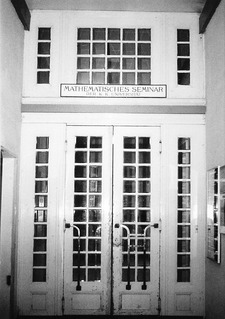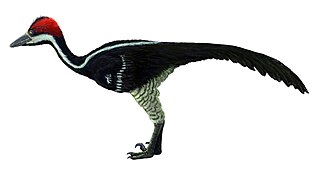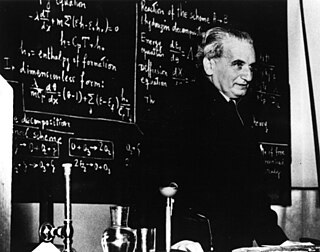
Werner Karl Heisenberg was a German theoretical physicist and one of the key pioneers of quantum mechanics. He published his work in 1925 in a breakthrough paper. In the subsequent series of papers with Max Born and Pascual Jordan, during the same year, this matrix formulation of quantum mechanics was substantially elaborated. He is known for the uncertainty principle, which he published in 1927. Heisenberg was awarded the 1932 Nobel Prize in Physics "for the creation of quantum mechanics".

The Vienna Circle of Logical Empiricism was a group of philosophers and scientists drawn from the natural and social sciences, logic and mathematics who met regularly from 1924 to 1936 at the University of Vienna, chaired by Moritz Schlick.

Manfred Eigen was a German biophysical chemist who won the 1967 Nobel Prize in Chemistry for work on measuring fast chemical reactions.

Ernst Alfred Cassirer was a German philosopher. Trained within the Neo-Kantian Marburg School, he initially followed his mentor Hermann Cohen in attempting to supply an idealistic philosophy of science.
The year 1935 in science and technology involved some significant events, listed below.

Grete Hermann was a German mathematician and philosopher noted for her work in mathematics, physics, philosophy and education. She is noted for her early philosophical work on the foundations of quantum mechanics, and is now known most of all for an early, but long-ignored critique of a "no hidden-variables theorem" by John von Neumann. It has been suggested that, had her critique not remained nearly unknown for decades, the historical development of quantum mechanics might have been very different.

Hans Reichenbach was a leading philosopher of science, educator, and proponent of logical empiricism. He was influential in the areas of science, education, and of logical empiricism. He founded the Gesellschaft für empirische Philosophie in Berlin in 1928, also known as the “Berlin Circle”. Carl Gustav Hempel, Richard von Mises, David Hilbert and Kurt Grelling all became members of the Berlin Circle.

Agnes Luise Wilhelmine Pockels was a German pioneer in chemistry. Her work was fundamental in establishing the modern discipline known as surface science, which describes the properties of liquid and solid surfaces. Agnes got interested in these properties early on from washing dishes.
Sven Ove Hansson is a Swedish philosopher. He is a professor of philosophy and chair of the Department of Philosophy and History of Technology at the Royal Institute of Technology (KTH) in Stockholm, Sweden. He is an author and scientific skeptic, with a special interest in environmental risk assessment, as well as in decision theory and belief revision.

Erich Rudolf Alexander Regener was a German physicist known primarily for the design and construction of instruments to measure cosmic ray intensity at various altitudes. He is also known for predicting a 2.8 K cosmic background radiation, for the invention of the scintillation counter which contributed to the discovery of the structure of the atom, for his calculation of the charge of an electron and for his early work on atmospheric ozone. He is also credited with the first use of rockets for scientific research.

Der Angriff is a discontinued German language newspaper founded in 1927 by the Berlin Gau of the Nazi Party. The last edition was published on 24 April 1945.

Karl Friedrich Franz Christian Scheel was a German physicist. He was a Senior Executive Officer and head of Department IIIb at the Reich Physical and Technical Institute. Additionally, he served as editor of the journal Fortschritte der Physik, the semi-monthly bibliographic section of the journal Physikalische Berichte, the Verhandlungen of the German Physical Society, and the Society’s journal Zeitschrift für Physik. From 1926 to 1935, he was editor of the Handbuch der Physik. An endowment by Scheel and his wife Melida funds the annual awarding of the Karl Scheel Prize by the Physical Society in Berlin.

August Engelhardt was a German author and founder of a sect of sun worshipers.
Arnold Berliner was a German physicist.

Troodontinae is a subfamily of troodontid dinosaurs. The subfamily was first used in 2017 for the group of troodontids descended from the last common ancestor of Gobivenator mongoliensis and Zanabazar junior.
Fritz Weigert was a German physical chemist. Weigert has made major contributions in the field of photochemistry. He was born in Berlin. He was the nephew of both Karl Weigert and Paul Ehrlich. He was married to Margarete Behmer. Around 1908, he began teaching and conducting research at Berlin University - after studying there. He was a photochemistry professor at Leipzig University from 1914 until being forced out by the Nazis in 1934. On January 1st, 1935, he immigrated to England and in 1936 was director of the Physiochemical Department of the Cancer Research Institute at Mount Vernon Hospital, Northwood.
Eugen Korschelt was a German zoologist. He is known for his research in the field of comparative embryology and his work involving biological regeneration and transplantation.

This is a bibliography of works by Theodore von Kármán.

Arnold Müller was an Austrian entomologist who was born and spent his life in what is now Romania. He is known for his studies of orthoptera and for his contributions to the Transylvanian Association for Natural Sciences.
Paul Louis Riebesell was a German mathematician, statistician, actuary, and president of Hamburger Feuerkasse. At the International Congress of Mathematicians, he was an invited speaker in 1932 in Zürich and in 1936 in Oslo.














